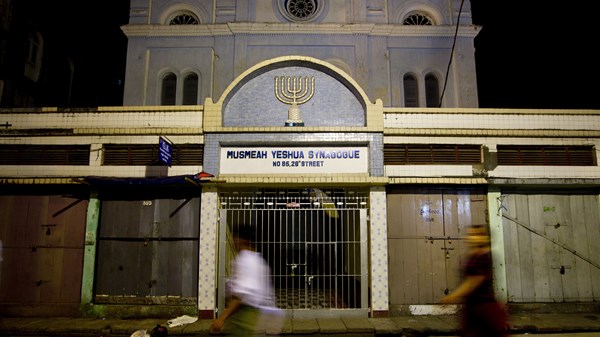The ornate colonial building on a bustling alleyway fits right in with the neighborhood. To enter, visitors don’t need to pass through any security checks or barriers — increasingly commonplace around the world, given rising attacks. The Musmeah Yeshua is the only synagogue in Yangon, Myanmar, and its doors are open, which is a source of pride for the city’s Jews and the majority Buddhist community.
That sense of security hasn’t always been afforded to the Jewish community in Yangon. Back in 1910, the community even boasted the city’s first Jewish mayor. But the Japanese, after their 1941 invasion, suspected Jews of spying for the British and sent some to concentration camps. Many Jews fled then, and most others left when the post-independence government nationalized private businesses in the 1960s. But with the country’s then–military rulers opening Myanmar up to the world seven years ago, at least 80 expat Jews have moved there to help rebuild the country and return it to the international fold while also reinvigorating Yangon’s tiny Jewish community of just about 10 people. The number of these returning Jews, though small, is emblematic of an unlikely pattern emerging across multiple cities.
At a time when Jewish communities from Paris to New York City to Manchester, England, are facing increasing threats, a rebirth is happening in Yangon and a host of other cities — such as Oporto, Portugal; Palermo, Sicily; Brighton, England; and Kraków, Poland — where they had almost disappeared.
Five years ago, the Jewish community was very small. … now
there is a great atmosphere. There are a lot of young people.
Last year, a small Jewish community of less than 50 people opened Palermo’s first synagogue in 500 years. In Brighton, where the first Jewish families came in the 19th century and where the community’s strength has fallen from around 10,000 people in the 1990s to 5,000 now, efforts are afoot to create a whole new set of religious and community spaces. Kraków’s Jewish community — once 60,000 strong and a quarter of the city’s population — was destroyed during the Holocaust. Only 8 percent survived, and almost all left. But a recent revival, including the establishment of a Jewish Community Center, means the city now has at least 700 Jewish residents. Dublin has seen its Jewish population rise from an estimated 1,000 in 2006 to 1,439, according to the latest census. And in Oporto, a citizenship law that became active in 2015 and that allows descendants of Jews exiled overseas before and during the Portuguese Inquisition to gain citizenship, combined with the city’s growing profile as a great place to live, has seen at least 200 Jews, many from Israel and France, move there in the last five years.






























Who in their right mind would return to Poland?